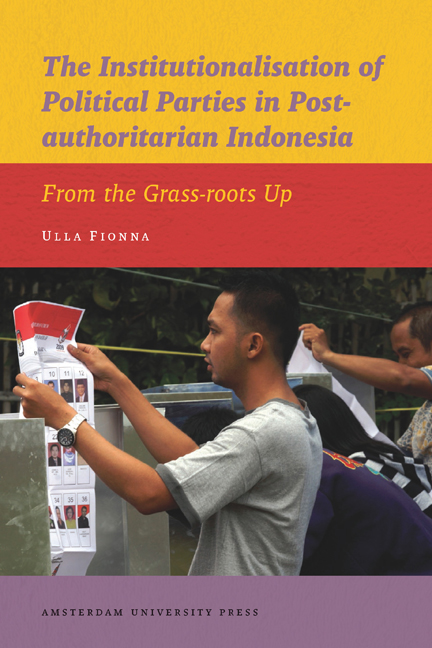 The Institutionalisation of Political Parties in Post-authoritarian Indonesia
The Institutionalisation of Political Parties in Post-authoritarian Indonesia Book contents
- Frontmatter
- Dedication
- Contents
- Preface
- Acknowledgements
- 1 The Question of Institutionalisation
- 2 Genesis of Modern Political Organisation in Indonesia
- 3 Diminishing Grass-roots Influence during the New Order
- 4 Party Organisation
- 5 Party Activities
- 6 Recruitment Approaches
- 7 Members’ Motivations and Participation in the Parties
- 8 Party Career and Intra-party Democracy
- 9 Progress of Party Institutionalisation and Its Role in Indonesia’s Democratisation
- Glossary
- Notes
- Bibliography
- Index
- Miscellaneous Endmatter
- Frontmatter
- Dedication
- Contents
- Preface
- Acknowledgements
- 1 The Question of Institutionalisation
- 2 Genesis of Modern Political Organisation in Indonesia
- 3 Diminishing Grass-roots Influence during the New Order
- 4 Party Organisation
- 5 Party Activities
- 6 Recruitment Approaches
- 7 Members’ Motivations and Participation in the Parties
- 8 Party Career and Intra-party Democracy
- 9 Progress of Party Institutionalisation and Its Role in Indonesia’s Democratisation
- Glossary
- Notes
- Bibliography
- Index
- Miscellaneous Endmatter
Summary
The newfound freedom that followed the fall of Suharto in May of 1998 was a shock, a wake-up call, and a great opportunity for Indonesian political parties after a long period of slumber. In the vastly more open political climate of the era of reformasi, the parties – now numbering over a hundred – were able to devote far more attention to organising at the grass-roots. Indeed, the Habibie government's electoral system required them to demonstrate that they had local branches as evidence of public support. In response, the parties developed different approaches to branch office management. But, in general, management of local branch offices relied more on the skills and initiatives of local leaders than on the branches’ relationships with their central party offices. The role of local party administrators was crucial in determining the efficiency of the branches and their management, as were staff skills and the swiftness of party responses to outside enquiries.
To fully grasp the situation of the Indonesian political parties in this era, a discussion of party organisation more generally is helpful. In particular, it will be useful to understand what constitutes a well-organised political party, and how the relationship between a central party office and local branches can shape a party's effectiveness.
Elements of Party Organisation
Political parties are, of course, not simply comprised of legislative members and their support staff. Extra-parliamentary organisations are a crucial element, as they can ‘facilitate or stifle political participation’ (Scarrow 1996: 11). In his cross-national study of party organisation, Janda (1980) examined the array of party organs in 50 countries and the management of the relationship between local and national bodies. He argues that a well-organised party has an extensive organisation that extends to the smallest unit at the local level. One example is Thailand's Democrat Party, whose supreme decision-making body encourages members to set up branches among constituencies in areas with no branches (Sejong Institute 2000). On the other hand, one of the weaknesses of South Korea's New Democratic Party (NDP) in the late 1960s was that while the party had branches among all constituencies, they were closed outside the election periods. As in New Order Indonesia, interaction with masses was thus limited to campaign periods (Han 1969: 463).
- Type
- Chapter
- Information
- The Institutionalisation of Political Parties in Post-authoritarian IndonesiaFrom the Grass-roots Up, pp. 75 - 94Publisher: Amsterdam University PressPrint publication year: 2013


